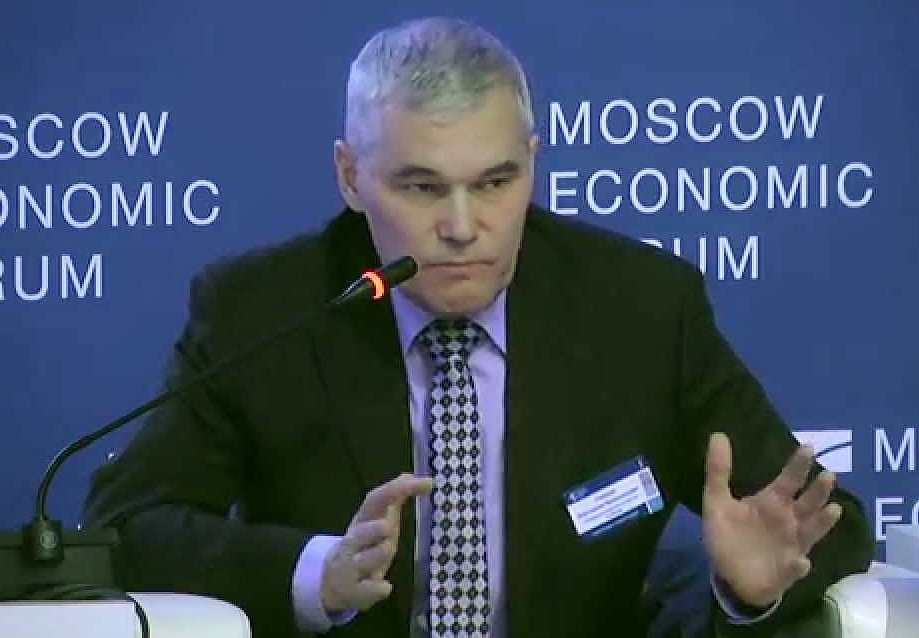
Unraveling the Kremlin’s Strategic Paradigm
Publication: Eurasia Daily Monitor Volume: 11 Issue: 89
By:

Since the eruption of the Ukraine crisis, Russian and Western commentators have tried to define those elements of Russian actions and policymaking that constitute “new” factors in Moscow’s relations with the West and its neighbors. On May 9, for example, with the threat of further use of military force in Ukraine still on the table, the Victory Day celebrations in Red Square were widely reported for their apparently “new” features: such as the size and duration of the parade (RIA Novosti, Interfax, RT, May 9). Early conclusions stemming from these observations and the activity of the Russian military in the crisis stress an increased level of assertiveness and confidence within the Russian political-military elite. However, there are strong grounds for concluding that the Kremlin’s strategic-level thinking features few innovations, whereas evidence of novelty lies more at the tactical level.
Following Deputy Prime Minister Dmitry Rogozin’s controversial May 9 trip to Tiraspol—the administrative capital of Moldova’s breakaway region of Transnistria—and his inflammatory remarks concerning the appearance of “little green men” in Transnistria if Chisinau signs the association agreement with the European Union, an editorial in Vedomosti argued that he is the person to listen to in order to understand Moscow’s future plans (https://www.vedomosti.ru/opinion/news/26334971/dmitrij-rogozin#ixzz31Urfja2S).
Nonetheless, at a less journalistic level, some serious Russian military thinkers do not just advocate drawing lessons from the recent Crimea operation, but also provide clues and insights into the Kremlin’s decision making during the crisis. Army-General (retired) Makhmut Gareev strongly urges the political leadership to pursue such a “lessons learned” approach (see EDM, May 6). Other specialists offer insight into how differently the Kremlin views the events unfolding in Ukraine compared to Western interpretations.
The clearest illustration of this latter point appeared in an article by Professor Lieutenant-General Vladimir Ostankov, a member of the Academy of Military Sciences and a widely respected military theorist. Ostankov’s analysis concerns reconciling the economic potential of the country and its threat environment to the task of building and training the type of Armed Forces it requires. He touches on a number of important inter-related issues as he develops this theme before making observations about the Ukraine crisis. Central to these points is the crucial Military Doctrine (2010) distinction between a military threat and a military danger to the state (https://www.vpk-news.ru/articles/20120).
Ostankov believes that Moscow has failed to square the circle in devising a program to develop the Armed Forces that suits the state’s threat environment and fits its economic limits, noting that the period 2008–2013 resulted in mistakes and an avoidance of moving to correct the underlying planning errors. Using the concepts of military threats and military dangers as his terms of reference, Ostankov concludes that the system of monitoring threats and dangers must be an objective one, as well as applying similar approaches to measuring the first level of combat readiness; measures may then be taken to deal with the varying degrees of dangers before they emerge as threats (https://www.vpk-news.ru/articles/20120).
Ostankov considers the Ukraine crisis precisely within these terms, asserting that the country emerged as a military threat to Russian security. On the one hand, he recognizes that the Ukrainian Armed Forces did not possess the capability to “stand up to Russia”; so in the strictest sense, Ukraine posed no direct threat to the Russian Federation. However, the “desire of Kyiv to join NATO [the North Atlantic Treaty Organization]” is cited as a factor increasing the level of “threat.” Ostankov also refers to the Kyiv-NATO factor as potentially contributing to an “aggravation” of the military-political situation in Europe. These interpretations are entirely consistent with Russian security documents, including the most recent Military Doctrine (2010) (https://www.vpk-news.ru/articles/20120).
If Ostankov’s thinking on this important issue seems unclear, its origins lie in Russian military doctrine and therefore these views can hardly be characterized as unique. He interprets Moscow’s decision making over Ukraine as entirely consistent with Russian security policy. Gareev understands that what was new in Crimea was the operational aspect; it was the tactics that differed. Ostankov also supports such thinking and sees Moscow’s actions as doctrinally logical and consistent.
In this context, Konstantin Sivkov, the president of the Academy of Geopolitical Problems, assesses the crisis from the perspective of explaining the campaign errors made by Kyiv in its pursuit of anti-terrorist operations. He questions the legitimacy of the Kyiv government and insufficient support throughout the country. Sivkov considers many of the failures of the anti-terrorist operations as reflecting the unwillingness of Ukrainian troops and security forces to fight against their fellow citizens, as well as a lack of military professionalism and training. He is also critical of the militants from “Right Sector,” arguing that in the face of force they prefer to flee. Sivkov also espouses various levels of conspiracy, such as alleging Central Intelligence Agency (CIA) involvement in Ukraine and referring to the presence of foreign private military companies (https://www.vpk-news.ru/issues/20111). Sivkov’s overall assessment of the crisis is inherently pessimistic: stressing the risk of conflict escalation, real civil war, and a possible collapse of the Ukrainian state.
Such Russian analyses of the crisis are consistent at the strategic level: the response to the EuroMaidan was not a contradiction of Moscow’s security documents. If foreigners were surprised, it was in seeing Moscow implement such strategy to the point of annexation. Gareev, Ostankov and Sivkov fail to address a wide range of questions, however. Gareev advocates learning lessons from the swift operation to control and annex Crimea, but offers no details. Ostankov fails to link the danger/threat analysis to why the Kremlin went as far as annexation. Equally, in Sivkov’s analysis there is no explanation as to why Moscow, having carefully built up its force option on the other side of the Ukrainian border, did not invade eastern and south eastern Ukraine in response to a number of events such as renewed anti-terrorist operations by Kyiv (see EDM, May 6; https://www.vpk-news.ru/issues/20111).
It is too early to assert and support the thesis that Moscow has shifted its foreign and security policies. It is also premature to allege that the Kremlin has altered its strategic models. What is clear is that there is no “playbook” and Russian analysts are at a loss to speculate or offer informed opinions on the Kremlin’s future plans on Ukraine, or in Eastern Europe. At analytical levels, the greatest failures in the West were to properly read and understand Russian security documents and strategy, and interpret the Kremlin’s policymaking based on its historical context. Doubtless, the Kremlin has and will make its own mistakes; perhaps the most potentially unpredictable is how to control the dogs of war.




